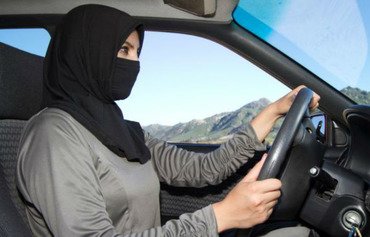Donning a helmet inside a pearl silver sports sedan, Rana Almimoni skids and drifts around a Riyadh park, engine roaring, tyres screeching and clouds of dust billowing from the back.
For Saudi women, such adrenaline rushes were unimaginable just weeks ago.
Speed-crazed women drivers are bound to turn heads in the deeply conservative desert kingdom, which overturned the world's only ban on female motorists in June as part of a much-hyped liberalisation drive led by Crown Prince Mohammed bin Salman.
Almimoni, 30 and a motor racing enthusiast, is defying the perception that only dainty cars in bright colours are popular with women drivers.
![In this file photo taken on June 24th, 2018, Aseel Al-Hamad, Saudi Arabia's first female racing driver and board member of the Saudi Arabian Motor Federation (SAMF), poses for a picture ahead of the Formula One Grand Prix de France at the Circuit Paul Ricard in Le Castellet, southern France. [Boris Horvat/AFP]](/cnmi_am/images/2018/08/29/14230-saudi-aseel-600_384.jpg)
In this file photo taken on June 24th, 2018, Aseel Al-Hamad, Saudi Arabia's first female racing driver and board member of the Saudi Arabian Motor Federation (SAMF), poses for a picture ahead of the Formula One Grand Prix de France at the Circuit Paul Ricard in Le Castellet, southern France. [Boris Horvat/AFP]
"I adore speed. I love speed... My dream car is more than 500 horsepower," said Almimoni, slamming the accelerator of her silvery sleek Kia Stinger inside Riyadh's Dirab motor park.
"It is a myth... that Saudi women only choose pink and cute cars."
Almimoni said she was awaiting an expected government decision that would permit women to obtain a "racing licence", which would allow her to hone her passion in motor-sport competitions.
That includes drifting –- oversteering the car to slip and skid or even spin, and other high-speed daredevilry -- which is illegal in public but tolerated in the controlled environment of Dirab park, whose private owners insist on safety.
Racing simulators
Auto showrooms tapping new women clients have rolled out a line-up of cherry red Mini Coopers, but sales professionals say many exhibit an appetite for muscle cars like the Camaro or the Mustang convertible.
Many new drivers seek inspiration from Aseel al-Hamad, the first female member of the kingdom's national motor federation, who got behind the wheel of a Formula One car in France in June to mark the end of the driving ban.
Clad in skinny jeans and Harley-Davidson T-shirts, a handful of women are also training to ride motorbikes at a Riyadh driving school.
Transport authorities have rolled out racing simulators to help first-time women drivers get a feel of being behind the wheel.
As a male traffic official demonstrated the importance of seatbelts by buckling up inside a car tethered to a flat platform and upturning the vehicle, some women zipped around twisted tracks in toy cars.
Another sat down behind the wheel of a simulator and instantly floored the accelerator, sending the speedometer soaring.
'Keeping off the streets'
"I do not feel I am in Saudi Arabia anymore," said Nagwa Mousa, a 57-year-old university professor in Riyadh.
"But I do not expect to see many women in Saudi Arabia overtaking and speeding in the streets anytime soon."
The driving reform is said to be transformative for women, freeing them from dependence on private chauffeurs or male relatives, but many are keeping off the streets.
For now, most women drivers appear to be those who have swapped foreign licences for Saudi ones after undergoing a practical test.
Many complain that driving courses cost several times more than those available to men and that women instructors are in short supply.
While no overt incidents of street harassment have been reported publicly, many women are also wary of pervasive sexism and aggression from male drivers despite warnings from authorities.

![Rana Almimoni, a 30-year-old Saudi motor racing enthusiast, poses with the thumbs-up gesture in her car on the track in Dirab motor park, on the southern outskirts of the capital Riyadh, on July 19th, 2018. [Fayez Nureldine/AFP]](/cnmi_am/images/2018/08/29/14231-saudi-almimoni-600_384.jpg)






